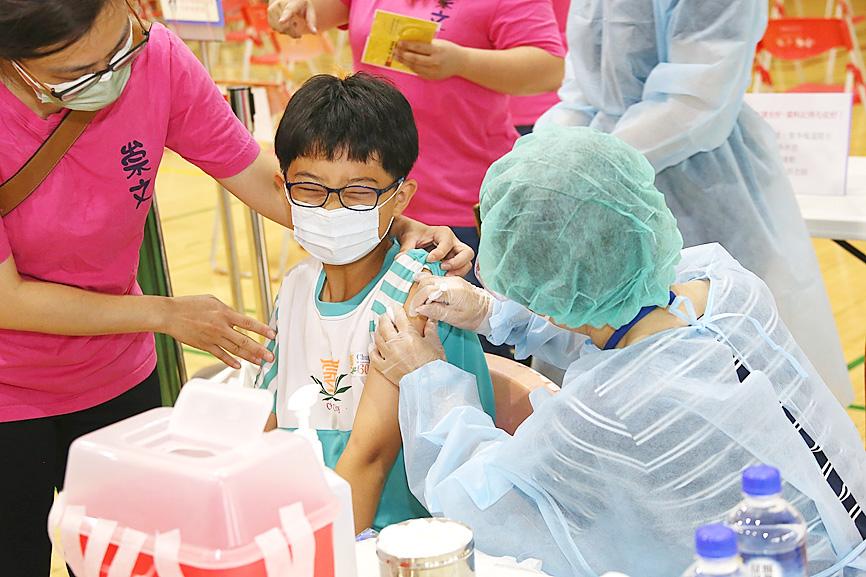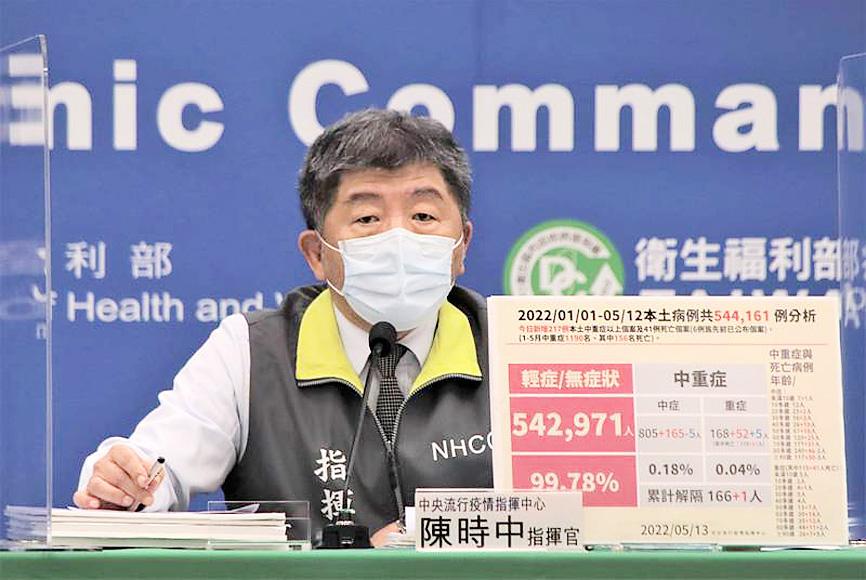People aged 65 or older, and those over 60 who are immunocompromised, will be eligible for a fourth dose of a COVID-19 vaccine beginning next week at the earliest, the Central Epidemic Command Center (CECC) said yesterday, as COVID-19 cases topped 60,000 for a second day.
People eligible for a fourth shot must wait at least five months after receiving their third dose to receive the next booster, said Centers for Disease Control Deputy Director-General Chuang Jen-hsiang (莊人祥), who is the CECC’s spokesman, adding that the center would soon announce a vaccination schedule.
The decision to start administering another round of COVID-19 boosters was made during an Advisory Committee on Immunization Practices meeting at the end of last month, the center said.

Photo: Wang Shan-yen, Taipei Times
A fourth vaccine dose might also be offered to people living in high-risk COVID-19 areas, Chuang said.
To date, at least 85.65 percent of the population has received at least one dose of a vaccine, 80.69 percent have received two and 62.5 percent three, CECC data showed.
Starting today, those who test positive for COVID-19 in a rapid antigen test while following a “3+4” quarantine plan for close contacts of a confirmed case or while in quarantine after arriving in Taiwan can have friends or relatives take their test kits to be confirmed in a medical consultation on their behalf, the CECC said.

Photo courtesy of the CECC
Previously, they were required to schedule a virtual doctor’s appointment or take a polymerase chain reaction test (PCR) to confirm that they had COVID-19.
Minister of Health and Welfare Chen Shih-chung (陳時中), who heads the center, said that the CECC had received complaints from people in quarantine over not understanding the process of booking a virtual doctor’s appointment.
Those who are unable to book a virtual consultation can have friends and relatives bring their rapid test results and the person’s National Health Insurance card to a clinic or the designated medical facility in charge of their home care for an assessment, he added.
To ease the burden on hospitals and clinics so they can focus on people with severe symptoms of COVID-19, President Tsai Ing-wen (蔡英文) yesterday called for the establishment of large PCR testing stations in New Taipei City, Taipei, Keelung and Taoyuan, Presidential Office spokesman Xavier Chang (張惇涵) said.
People who test positive at the stations can also apply for medical prescriptions at the site, he said.
In addition to asking the CECC to continue simplifying procedures for people to see doctors quickly and obtain medication, Tsai at a disease-prevention meeting at the Presidential Office said the government should continue purchasing COVID-19 medications and rapid test kits to ensure a steady supply.
COVID-19 cases yesterday exceeded 60,000 for the second consecutive day, with the CECC reporting 65,011 new cases and 41 deaths from the disease.
The new cases consisted of 64,972 local and 39 imported infections, it said.
Among the reported deaths, 21 were unvaccinated, while six had received one dose of a COVID-19 vaccine, two had received two and 12 had received three, the center said.
All but one of the people who died had underlying medical conditions, including cardiovascular disease, diabetes, chronic lung disease, chronic kidney disease, stroke and cancer, it said.
New Taipei City yesterday reported the highest number of domestic cases with 22,483, followed by Taipei with 11,613, Taoyuan with 9,434, Taichung with 3,708 and Kaohsiung with 3,664.

PREPAREDNESS: Given the difficulty of importing ammunition during wartime, the Ministry of National Defense said it would prioritize ‘coproduction’ partnerships A newly formed unit of the Marine Corps tasked with land-based security operations has recently replaced its aging, domestically produced rifles with more advanced, US-made M4A1 rifles, a source said yesterday. The unnamed source familiar with the matter said the First Security Battalion of the Marine Corps’ Air Defense and Base Guard Group has replaced its older T65K2 rifles, which have been in service since the late 1980s, with the newly received M4A1s. The source did not say exactly when the upgrade took place or how many M4A1s were issued to the battalion. The confirmation came after Chinese-language media reported

A Ministry of Foreign Affairs official yesterday said that a delegation that visited China for an APEC meeting did not receive any kind of treatment that downgraded Taiwan’s sovereignty. Department of International Organizations Director-General Jonathan Sun (孫儉元) said that he and a group of ministry officials visited Shenzhen, China, to attend the APEC Informal Senior Officials’ Meeting last month. The trip went “smoothly and safely” for all Taiwanese delegates, as the Chinese side arranged the trip in accordance with long-standing practices, Sun said at the ministry’s weekly briefing. The Taiwanese group did not encounter any political suppression, he said. Sun made the remarks when

The Taiwanese passport ranked 33rd in a global listing of passports by convenience this month, rising three places from last month’s ranking, but matching its position in January last year. The Henley Passport Index, an international ranking of passports by the number of designations its holder can travel to without a visa, showed that the Taiwan passport enables holders to travel to 139 countries and territories without a visa. Singapore’s passport was ranked the most powerful with visa-free access to 192 destinations out of 227, according to the index published on Tuesday by UK-based migration investment consultancy firm Henley and Partners. Japan’s and

BROAD AGREEMENT: The two are nearing a trade deal to reduce Taiwan’s tariff to 15% and a commitment for TSMC to build five more fabs, a ‘New York Times’ report said Taiwan and the US have reached a broad consensus on a trade deal, the Executive Yuan’s Office of Trade Negotiations said yesterday, after a report said that Washington is set to reduce Taiwan’s tariff rate to 15 percent. The New York Times on Monday reported that the two nations are nearing a trade deal to reduce Taiwan’s tariff rate to 15 percent and commit Taiwan Semiconductor Manufacturing Co (TSMC, 台積電) to building at least five more facilities in the US. “The agreement, which has been under negotiation for months, is being legally scrubbed and could be announced this month,” the paper said,